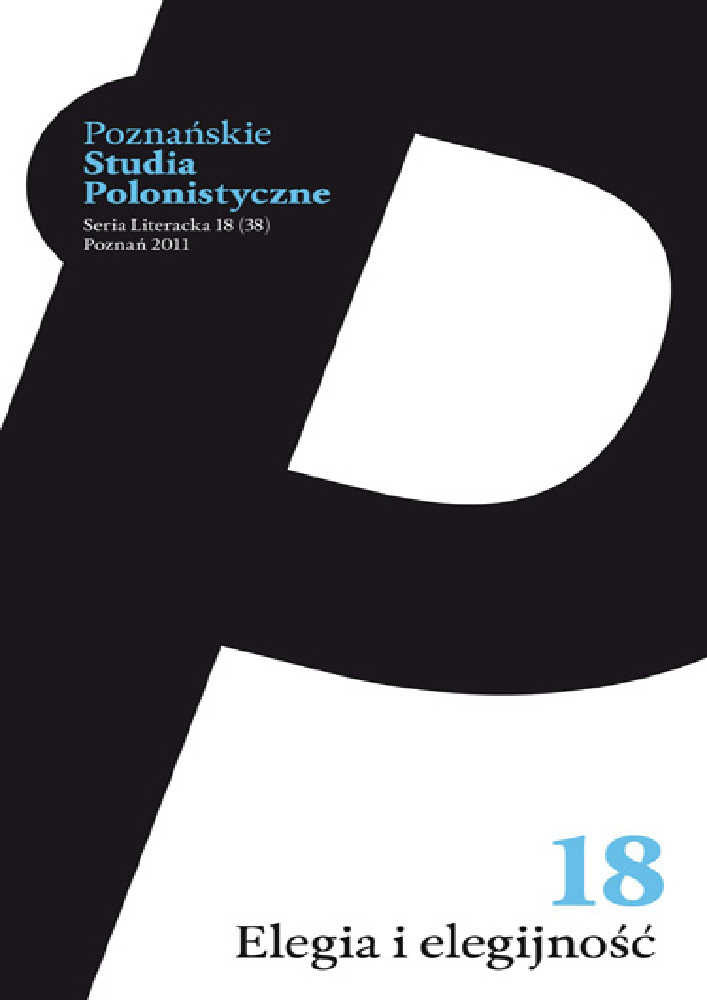Abstract
The question that this is article is concerned to answer is how the position of the film elegy can be best formally established — with its artistic representations, as well as its functioning in the genology of the genre. An attempt to provide definitive answers that emerge from interdisciplinary, film and literary discourse brings a number of substantial threads. Firstly, there is, indeed, no theoretical description of the elegy as a film genre, though the very name does appear in many titles. Secondly, it seems that a juxtaposition of available examples of film ad-aptations of elegies does not lead to any consistent conclusion, since, apart from the suggestion proposed by the author, they are different in terms of formal and thematic elements involved. Thirdly, any attempt at a genological profiling has to, somehow, refer to a more or less fixed literary genre and the relevant theory behind it. In a most general way, one can state, albeit with a number of reservations, that the elegiac film is characterized by a distinguishable style, often simply called the elegiac style, and the theme, very broadly associated with time and the theme of passing.
References
Bayley J., Iris, przeł. K. Bogucka-Krenz, Warszawa 2002.
Helman A., Problemy interpretacji dzieł filmowych, w: Interpretacja dzieła, red. M. Czerwiński, Wrocław 1987.
„Filmowy Serwis Prasowy” 1979, nr 19.
Gijsen M., Elegia na śmierć Agnes, przeł. A. Wojtaś, Warszawa 1980.
Hendrykowski M., Ballada filmowa [hasło], w: Leksykon gatunków filmowych, Poznań–Wrocław 2001.
Hendrykowski M., Gatunek filmowy [hasło], w: Leksykon gatunków filmowych, Poznań–Wrocław 2001.
Kuczyńska-Koschany K., Skarga, roślina wiecznie zielona, w: Rycerz i Śmierć. O „Elegiach duinejskich” Rainera Marii Rilkego, Gdańsk 2010.
Legeżyńska A., Gest pożegnania. Szkice o poetyckiej świadomości elegijno-ironicznej, Poznań 1999.
Miczka T., Gatunek [hasło], w: Słownik pojęć filmowych, t. 10, red. A. Helman, Kraków 1998, s. 43–91.
Opacki I., Odwrócona elegia („Na sprowadzenie prochów Napoleona” Juliusza Słowackiego), w: Odwrócona elegia. O przenikaniu się postaci gatunkowych w poezji, Katowice 1999.
Ożóg J.B., Elegia, w: Elegia weselna i inne opowiadania, Warszawa 1977.
Rutkowska T., Ballada filmowa – czyli o „powrotach, które trwają w nieskończoność”, w: Sztuka na wysokości oczu. Film i antropologia, red. Z. Benedyktowicz, D. Palczewska, T. Rutkowska, Warszawa 1991.
Semczuk M., Elegia [hasło], w: Słownik literatury polskiej XX wieku, red. A. Brodzka et al., Wrocław 1992.
Sławiński J., Elegia [hasło], w: Słownik terminów literackich, red. J. Sławiński et al., Wrocław 1998.
Tomow A. Elegia dla ptaków, przeł. L. Bardijewska, Warszawa 1989.
Tudor A., Metoda krytyczna: autorzy i gatunki, przeł. J. Mach, „Kino” 1976, nr 3.
License
Authors
Authors of texts accepted for publication in „Poznańskie Studia Polonistyczne. Seria Literacka” are required to complete, sign and return to the editor's office the Agreement for granting a royalty-free license to works with a commitment to grant a CC sub-license.
Under the agreement, the authors of texts published in „Poznańskie Studia Polonistyczne. Seria Literacka” grant the Adam Mickiewicz University in Poznań a non-exclusive, royalty-free license and authorize the use of Attribution-NoDerivatives 4.0 International (CC BY-ND 4.0)Creative Commons sub-license.
The authors retain the right to continue the free disposal of the work.
Users
Interested Internet users are entitled to use works published in „Poznańskie Studia Polonistyczne. Seria Literacka” since 2016, for non-commercial purposes only, under the following conditions:
- attribution - obligation to provide, together with the distributed work, information about the authorship, title, source (link to the original work, DOI) and the license itself.
- no derivatives - the work must be preserved in its original form, without the author's consent it is not possible to distribute the modified work, such as translations, publications, etc.
Copyrights are reserved for all texts published before 2016.
Miscellaneous
Adam Mickiewicz University in Poznań retains the right to magazines as a whole (layout, graphic form, title, cover design, logo etc.).
